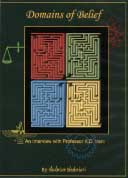|

|
About Keikhosrov Irani:
Professor Emeritus Kaikhosrov Dinshah Irani was born in Bombay, India on
May 1, 1922. He is the elder son of Dinshah Irani and Banu Mithibai
Sethna. In college, he studied Chemistry, then Physical Chemistry and then
Physics. During the war years, he studied Law and briefly practiced at his
father's old law firm. In 1946, he moved to the United States to continue
his studies which included a short stay at Princeton University, where he
got to work with Albert Einstein. Upon completion of his studies, he began
teaching at City College of New York, where he taught philosophy for the
following 41 years, and also served as the chairman of the Department of
Philosophy for nine years. He has also served as Director of the Academy
of Sciences and Humanities of the City College of New York, and was a
member of the Academy of Science in New York, the American Philosophical
Association, the Philosophy of Science Association, and the American
Academy of Religion. In 1981, he delivered the Government of India
Fellowship Lectures at the K.R. Cama Oriental Institute. He has lectured
in his field at a number of universities including UCLA, the universities
of Michigan, London, Göthenburg, Vienna and Sydney. In 1999, he was
singularly honored by the establishment of the K.D. Irani chair of
Philosophy, at the City College of New York, through an anonymous
contribution by one of his former students.
Review:
Shahriar Shahriari has created an intimate portrait of a man who is
considered by many to be amongst the greatest thinkers of our times.
Professor Kaikhosrov D. Irani discusses his interactions with such great
thinkers as Albert Einstein and Mahatma Gandhi and how they influenced him
early in his career. While viewing this program, you are placed in the
middle of the conversation as if you are participating in the stimulating
banter that appears on the screen. For instance you will anxiously wait
to learn how Albert Einstein helped Professor Irani get a pay raise before
even starting his position.
The first DVD of Domains of Belief
begins with a discussion on the philosophy of science, bringing insights
into the way Einstein and those around him thought. The ways in which
simple ideas become world changing theories are discussed, as well as the
reasons why one may want to get involved in such pursuits. In part two
the discussion is brought to Zarathushtra’s teachings. First the roots of
the religion are discussed, then it’s philosophy and place in the world.
In the second DVD of Domains of Belief Prof. Irani explains his
groundbreaking work in philosophy within the context of his own life and
experiences.
If you have ever wondered about what makes
those who change the world different from those who do not - you should
watch Domains of Belief. Prof. Irani, urged on by Shahriar’s
curiosity, paints a portrait of our times, our thoughts and our domains of
belief. They also illustrate how easily one can interact with, and become
one of those who change the world. Domains of Belief should become
an integral part of our public and private collections for it inspires us
to continue to renovate and renew the world.
In 2003 at the time of this writing, Trity
Pourbahrami was a Masters student at the University of Hawaii School of
Social Welfare and Department of Public Administration & Peter Capac is a
doctoral student at the University of Hawaii Institute for Astronomy
[i]
This review appeared in the Winter 2003 issue of the FEZANA journal
and has been reproduced with permission of the author of the review.
|